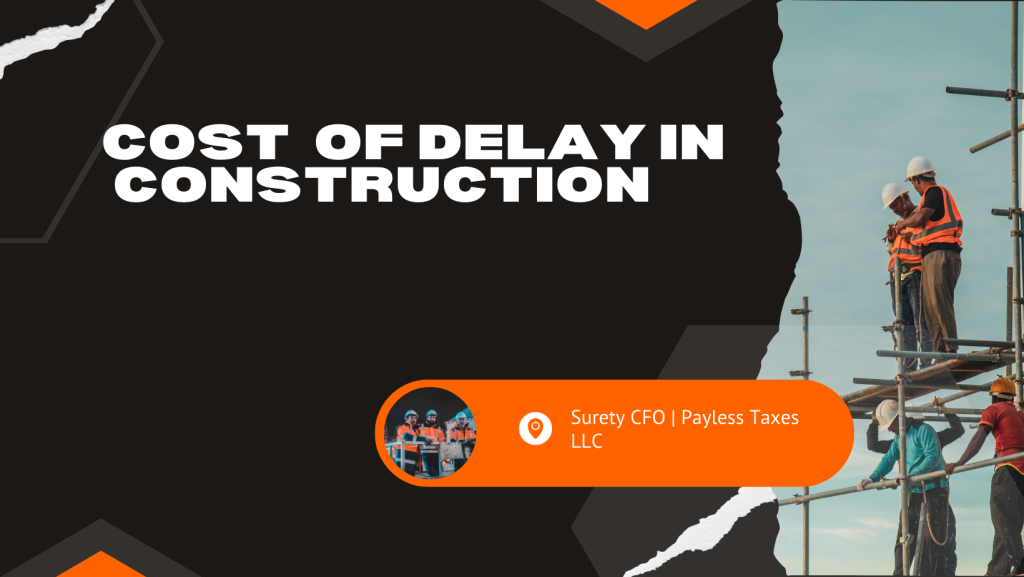
🚧 Project Delays Happen — But They Don’t Have to Wreck Your Budget
In commercial construction, delays are inevitable. Weather, labor shortages, permit issues, material backorders—there’s no shortage of ways a timeline can slip. But while some delays are unavoidable, what is preventable is the financial damage they can cause.
And the secret weapon?
👉 Smart construction accounting.
With the right cost-tracking and accounting systems in place, you can spot problems early, adjust quickly, and protect your profit margins, even when schedules shift.
Let’s break down how delays impact your budget—and how good accounting can help you stay in control.
⏱️ How Delays Impact Your Bottom Line
Every day a project goes over schedule can cost you more than just time. Delays can quietly stack up costs in ways many teams underestimate.
🔁 Extended Overhead
- Project managers, site supervisors, admin time—these all cost money daily.
- A one-month delay? That’s one more month of payroll, utilities, and insurance.
🧱 Idle Labor and Equipment
- If your crews or rented equipment are scheduled but can’t work, you’re paying for downtime.
📦 Material Price Fluctuations
- Some delays push work into a new quarter or season, where prices increase.
- Holding material too long can also increase storage costs or risk of damage.
💵 Liquidated Damages & Penalties
- Many commercial contracts include liquidated damages for late delivery—$500 to $5,000+ per day is not uncommon.
🚫 Opportunity Cost
- If your team is stuck on a delayed job, you might miss out on starting another profitable one.
🧮 Construction Accounting to the Rescue: 5 Ways to Stay on Budget
With strong construction accounting practices, delays don’t have to spell disaster. Here’s how smart cost tracking keeps your budget safe—even when timelines change.
1. 📊 Real-Time Job Costing = Early Warning System
Job costing lets you track actual costs against budget by phase—labor, subs, equipment, materials.
🔍 Why it matters:
You’ll see budget creep early, not after the job closes out.
If labor costs spike in Phase 2, or equipment rentals are stacking up, job costing flags it fast—so you can take action before it snowballs.
2. 📅 Forecast Cost-to-Complete with Confidence
When delays hit, you need to update your cost-to-complete forecast ASAP. Good accounting software makes it easy to:
- Adjust estimated labor needs
- Factor in new material costs
- Recalculate overhead extension
✅ The result?
You know the new true cost of finishing the job—and can prepare for it.
3. 🧾 Change Order Tracking Keeps Your Margins Protected
Delays often bring scope changes. Whether it’s due to redesign, inspection delays, or owner changes, each change order must be:
- Documented
- Priced correctly
- Approved and invoiced
With integrated change order tracking, you ensure:
- You’re not doing work for free
- Margins are maintained
- Nothing gets lost between the field and finance
4. 💸 Monitor Cash Flow in Real Time
Delays usually push out billing milestones. Without proper tracking, this can starve your cash flow.
Construction-focused accounting tools let you:
- Project when payments will hit
- Monitor retainage and underbilling
- Align expenses with expected receivables
That way, even if a delay slows down revenue, your financial team can plan ahead—not panic.
5. 🧠 Better Insights = Better Planning
The more projects you track, the more insight you have. Over time, your accounting system builds a goldmine of data:
- Which vendors or project types tend to delay?
- Which crews finish ahead of schedule?
- How long do change orders really take?
You can use this data to improve future bids, schedules, and risk management.
✅ Final Takeaway: Delays Are Inevitable—Losing Money Isn’t
In construction, you can’t control the weather—but you can control your finances.
Smart construction accounting gives you:
- Early warnings when costs drift
- Tools to adapt budgets in real-time
- Accurate change order tracking
- Clear visibility into cash flow
And most importantly, it gives you the power to stay profitable—even when plans shift.
📣 Need Help Tracking the True Cost of Your Projects?
Whether you’re using spreadsheets or software like Procore, Sage, or QuickBooks, we can help you implement the right systems to track costs and avoid budget blowouts.
👉 Schedule a free consultation →
Let’s build the financial toolkit that keeps your projects on track—even when the schedule slips.
